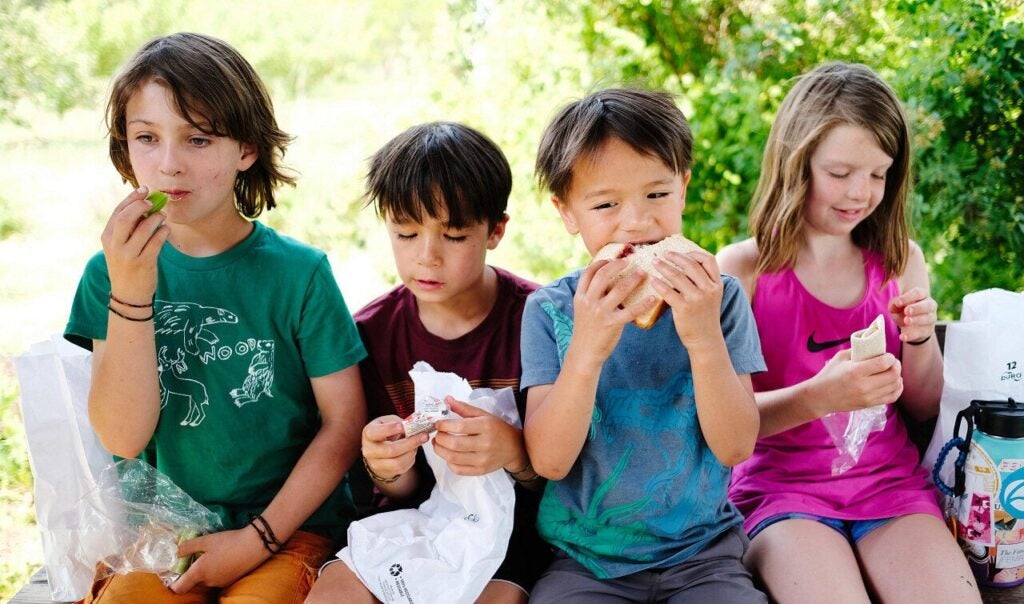School Meals
Schools are at the center of our communities and our kids’ lives. That’s why school meal programs are at the heart of No Kid Hungry’s work.
School Breakfast
Every day, students in Pennsylvania start their school day on an empty stomach. It’s hard for them to focus and learn, which is why it’s critical for them to start their day off right with a healthy breakfast. The School Breakfast Program, created in 1975 is a federally-funded program operated by school districts across the country to facilitate making a balanced breakfast more accessible for all students.
Participation by traditional school breakfast can be hindered by many factors, including:
- Transportation: The school bus doesn’t arrive with enough time for students to get breakfast in the cafeteria and eat it before school starts.
- Stigma: Particularly in middle and high school students, there is often a stigma associated with eating breakfast in the cafeteria and students will avoid it to ensure they aren’t perceived negatively by their peers.
- Lack of resources: For low-income families, sometimes there may not be enough food at home for a healthy breakfast.
- Busy mornings: Regardless of income, many families are rushed in the morning and don’t have time to eat breakfast at home.
of students eligible for free or reduced price meals eat school breakfast.

Solving the Problem
We know that students who participate in school breakfast achieve higher test scores and attend school more regularly. That’s why we work to increase participation as a part of our strategy to end childhood hunger by incorporating Breakfast After the Bell. We provide schools with necessary technical expertise and grants, working with them on ways to increase the number of kids by incorporating breakfast as a part of the school day.
Learn more about breakfast after the bell models like Breakfast in the Classroom, Grab and Go and Second Chance Breakfast.
of students eligible for free or reduced price meals eat school lunch.
School Lunch
School lunch offers students a healthy, balanced meal that they can rely upon during the school day. The National School Lunch Program is the nation’s second largest food and nutrition assistance program and feeds more than 30 million children each day. Healthy school lunches boost academic performance and closes the opportunity gap for children across the country.
Solving the Problem
At No Kid Hungry Pennsylvania, we know that one of the best ways to ensure that students who rely on school meals have access to them is by offering them at no cost.
There are several funding options for expanding no cost school meals. To learn more about those options, we encourage you to visit the links below:
Summer Meals
Summer is a time for connection, exploration, and fun! Summer meal programs make sure children and young people have the nutrition they need to do just that. During the school year, meals are available to kids through school breakfast and lunch. But kids lose critical access to meals during the summer when schools are out. To fill this gap, many local schools and community organizations across Pennsylvania operate summer meal programs to provide food to kids at no cost. Summer meal programs are operated locally, overseen by the Pennsylvania Department of Education, and administered and funded by the US Department of Agriculture.
Summer meals are:
- Available for any kid or teen up to age 18 or younger
- Served at no cost
- Provided with no paperwork, personal identification, or signups
- Fun! Many programs incorporate fun activities like art projects, sports, and science experiments in addition to serving meals

Barriers
Summer meals haven’t been reaching all the children and young people who experience food insecurity. Without reliable sources of healthy food throughout the summer, kids who live with families experiencing financial hardship are at greater risk of returning to school further behind academically, which can have exponential ramifications year after year.
One of the main barriers to participation in Summer Meals is because kids and families simply don’t know they exist! To help combat this every year, No Kid Hungry runs a free texting service that helps connect families with meals in their neighborhoods.
Parents and caregivers simply text the word “FOOD” or “COMIDA” to 304-304 to see nearby meal locations. They can also access the texting service via WhatsApp by visiting NoKidHungry.org/WhatsApp.
Another reason for low summer meals participation is limited transportation. In both rural and urban areas, if parents work during the day, children may be unable to get to the locations where meals and activities happen. That’s why we’ve made it one of our top priorities to support summer grocery benefits and non-congregate meal service wherever possible. Non-congregate models like grab & go pick-up or delivery allow children to eat at home and provide more flexibility and support to families, and grocery benefits give households more buying power to cover additional meals at home.
Solving the Problem
For the first time, programs in rural areas may be eligible to serve non-congregate meals. The passage of the Consolidated Appropriations Act of 2023 permanently authorized a non-congregate meal service option for rural communities without access to a congregate site. It also created a permanent nationwide Summer Electronic Benefit Transfer Program (Summer EBT or SUN Bucks) starting summer 2024 that will provide grocery benefits to families of children and young people eligible for free or reduced-price school meals.
Together, rural non-congregate meals, SUN Bucks, and traditional congregate meals form a Summer Meals program that can better combat summer hunger.
No Kid Hungry Pennsylvania has joined communities across the state who are offering summer meals to provide support, guidance, and funding to ensure children and young people have access to needed food when school is out.